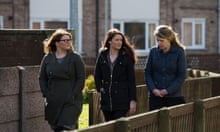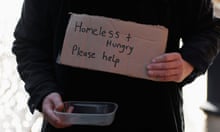Natasha was born in prison. She grew up being moved from place to place without anywhere to really call home. Violence was a daily and normal part of her childhood. By 12 years old, she was having sex with older men.
As an adult she had poor mental health and low self-esteem and, an easy target for perpetrators, she went on to have a series of abusive relationships. She spent time in prison, was homeless and had four children taken into care. Without a home she felt rootless and unable to get her life back on track.
For many women, housing need goes hand in hand with violence, abuse and other vulnerabilities. Research carried out for Agenda, an alliance for women and girls at risk, found that 1 in 20 women experience sexual and physical abuse [pdf] as both adults and children. That’s 1.2 million women in England. Too many end up in substandard housing or facing homelessness.
Natasha finally got her first flat in a housing association aged 25, and she felt it was the fresh start she, her new baby and her partner needed. It was much more than a roof over her head and, with support, she has rebuilt her life.
It’s easy to see how poor housing and homelessness can cause ill health. Struggling to pay the rent or bills, the threat of eviction, worrying about where you’re going to spend the night. All these things can make you physically and mentally ill.
Mothers have the additional worry of the impact of poor housing on their children. Living with mould or damp, with mice or cockroaches, in a cramped and stressful space. The possibility of bailiffs at the door or having to move into temporary accommodation far away from school, friends and family. This all takes a significant toll on mothers’ and children’s wellbeing.
For women who have had the most unstable lives, secure housing is essential to begin addressing the problems they face. Yet those who most need stable, safe, decent housing are the least likely to have it.
Women who have faced the most extensive abuse and violence are twice as likely to live in rented accommodation; twice as likely to live in a house with mould; and eight times as likely to be seriously behind with the rent. One in five has been homeless: they are 20 times more likely to have been homeless than women without these experiences.
Many women become homeless fleeing violence [pdf] and homelessness puts them at risk of further violence. Women are less likely to sleep rough for fear of being attacked. Some instead sleep in places like buses, but they are also more likely to go to extreme lengths to avoid rough sleeping – like entering into unwanted sexual partnerships or being involved in prostitution.
Homeless women face particularly high levels of mental ill health. They are more likely to have post-traumatic stress disorder linked to experiences of physical and sexual violence, more likely to have self-harmed or attempted suicide, more likely to be using heroin or crack cocaine. The average age of death for homeless women is just 43 years old [pdf].
Resolving homelessness and housing need is about more than just providing a place to live. People need support to rebuild their lives.
Homeless services like hostels or day centres are mainly used by men, so they can be intimidating and unsafe places for women – especially those with experience of abuse and violence. There are few refuges that support women with the most complex needs.
We need services set up to respond to women’s particular needs and experiences. We need to recognise that most homeless women have had very traumatic lives and are very vulnerable; they are often mothers, even if their children are not with them.
Housing providers and other services need to recognise the prevalence of domestic and sexual violence, to understand the impacts on women’s health and housing and to be asking about and responding to those experiences.
A stable, safe home linked to proper support can be the base from which women build a recovery. If we want to give vulnerable women the stability and security to turn their lives around, it’s essential that we tackle homelessness and poor housing.
Join the Guardian Housing Network to read more pieces like this. Follow us on Twitter (@GuardianHousing) and like us on Facebook to keep up with the latest social housing news and views.








